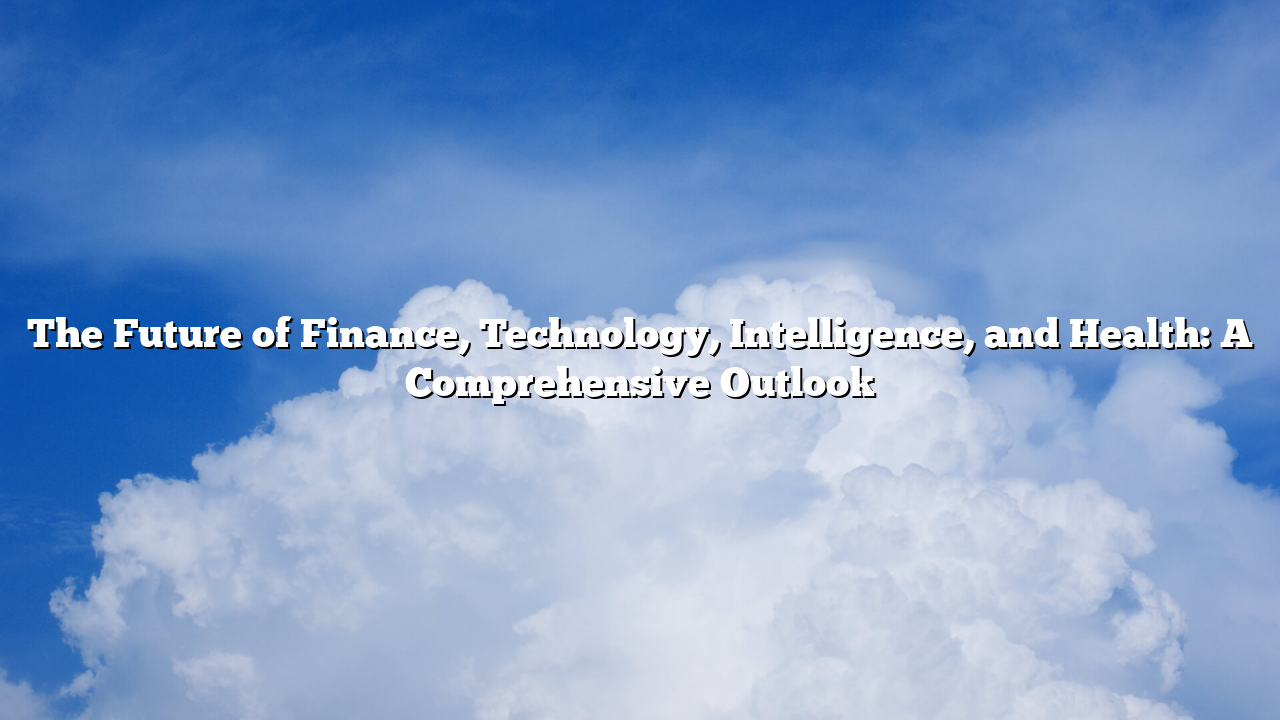—
Finance, technology, intelligence, and health are not just isolated sectors—they are deeply intertwined, influencing each other in ways that shape the future. The integration of these domains is a catalyst for change, and their development is essential for a sustainable future. In this article, we delve into how these four areas are progressing and converging, exploring their mutual influence.
Finance: The Changing Landscape of Global Economies
In the past few decades, the world of finance has undergone significant transformations. From the rise of digital currencies to the increasing use of artificial intelligence in financial decision-making, finance is becoming more technology-driven. The development of blockchain technology has paved the way for decentralized finance (DeFi), which challenges traditional banking systems and promises a more inclusive and transparent financial ecosystem.
Fintech innovations are reshaping how people manage money and invest. Mobile payment apps, peer-to-peer lending platforms, and robo-advisors are making it easier for people to access financial services without the need for traditional intermediaries. The rise of digital-only banks and investment platforms has democratized finance, allowing individuals to make informed decisions with minimal effort.
Technology: The Catalyst for Change
Technology is the driving force behind many of the advancements in the fields of finance, intelligence, and health. From the internet of things (IoT) to artificial intelligence (AI) and machine learning, technological innovations are revolutionizing industries across the globe. In finance, AI is being used to predict market trends, automate trading, and personalize financial services. In healthcare, AI and big data are enabling more accurate diagnostics, personalized treatments, and improved patient outcomes.
Furthermore, the rapid growth of cloud computing has allowed businesses to store and process vast amounts of data, enabling more sophisticated analysis and decision-making. This trend is evident in industries like finance, where data analytics is increasingly used to predict trends and optimize investment strategies. Similarly, in healthcare, cloud platforms facilitate the sharing of medical records, leading to improved collaboration and better patient care.
Intelligence: The Role of Artificial Intelligence in Shaping the Future
Artificial intelligence (AI) is rapidly becoming one of the most influential technologies of the 21st century. In samosir88 , AI is used to create algorithmic trading systems, assess risks, and detect fraud. By processing vast amounts of data, AI can predict market trends and optimize investment strategies. In healthcare, AI-powered systems are revolutionizing diagnostics and treatment plans, helping doctors make more informed decisions. Additionally, AI is enhancing the personalization of healthcare by tailoring treatments to individual patients based on their genetic makeup.
While AI offers immense potential, it also presents challenges. Issues like data privacy, algorithmic biases, and job displacement need to be addressed as AI technologies become more embedded in daily life. Ensuring that AI is developed and implemented ethically will require cooperation between industry leaders, governments, and other stakeholders to create robust regulations that protect individuals’ rights and promote fairness.
Health: The Intersection of Technology and Well-being
Health technology is evolving rapidly, enabling more personalized and effective treatments. Advances in genomics, AI, and wearable devices are helping doctors tailor treatments to individual patients, improving outcomes. Wearable health devices like fitness trackers are also playing a key role in helping people maintain their health and fitness levels, providing real-time feedback on vital signs like heart rate, steps taken, and sleep patterns.
Telemedicine is revolutionizing healthcare access, enabling patients to consult with doctors remotely. This technology is particularly beneficial for people in rural areas or those with limited access to healthcare facilities. The COVID-19 pandemic accelerated the adoption of telemedicine, and its benefits are now being realized across the globe. By reducing travel time and improving convenience, telemedicine is making healthcare more efficient and accessible.
—
In conclusion, the intersection of finance, technology, intelligence, and health is creating a new wave of innovation and opportunities. As these domains continue to evolve, their impact will shape the way we live, work, and interact with one another. The future promises an exciting blend of advancements that will enhance the quality of life for individuals around the world.
